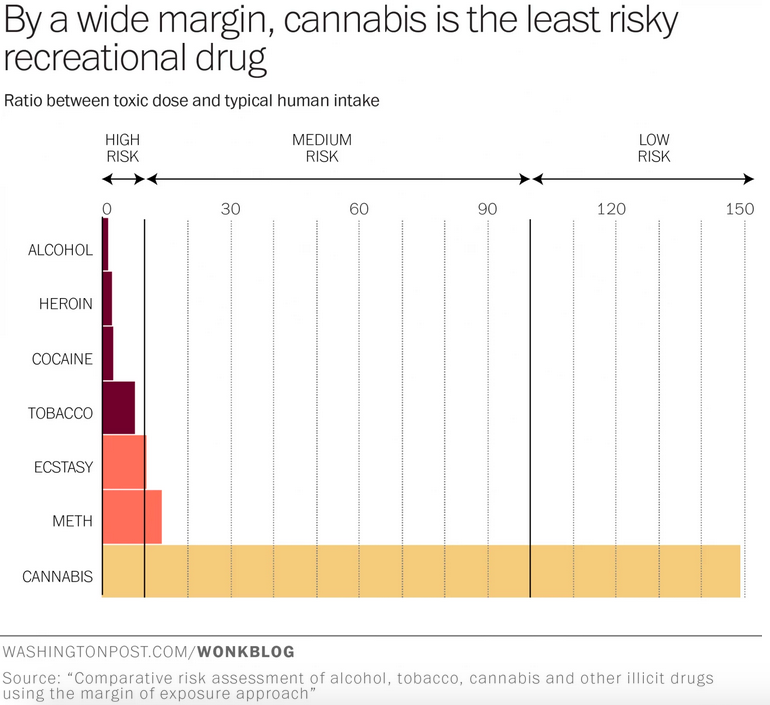Binge Drinking Among Women is Way Up. But There's An Easy Solution

By:
A new study from the Institute for Health Metrics and Evaluation just revealed a 17.5 percent spike in binge drinking among women between 2005 and 2012, while men's drinking only increased by 4.9 percent. “We are seeing some very alarming trends in alcohol over-consumption, especially among women,” said Dr. Ali Mokdad, a lead author of the study and professor at IHME. While drinking can be fun and relaxing, it has significantly worse health effects (organ damage, liver cirrhosis, heart disease, etc) than marijuana; accordingly, feminist writer Jessica Valenti recently made the case for women swapping booze for weed.
Because women are twice as likely to have anxiety disorders, more prone to depression, and more likely to be stressed out, marijuana offers a harmless replacement for alcohol, she argues.
"I’ve bet you’ve seen plenty of drunken fights and violence in your lifetime, but the only thing a high person is likely to get worked up about is the number of cheetos left," Valenti writes in a new Guardian piece. "I’m not advocating that women break out the bong and start a daily weed habit, but if you’re going to use a substance on a regular basis, it seems clear that marijuana use does significantly less damage than drinking. Especially if you’re using it to help quell anxiety issues."
The problem with alcohol
Among other things, imbibing allows women temporarily to let go of their anxieties and stresses. Jan Bauer, author of Alcoholism and Women: The Background and the Psychology, told The Atlantic two years ago that women often desire "oblivion drinking" for this reason, "Alcohol offers a time out from doing it all—‘Take me out of my perfectionism.’ Superwoman is a cliché now, but it is extremely dangerous."
Dangerous indeed. Earlier this year, findings from Scientific Reports revealed alcohol is almost 115 times more harmful than marijuana. Comparing lethal ingestion levels for alcohol, tobacco, heroin, cocaine, ecstasy, meth, and marijuana, the researchers found that pot had the lowest rate of death.
 WaPo - washingtonpost.com
WaPo - washingtonpost.com
According to the National Institute on Alcohol Abuse and Alcoholism, 5.8 million women had an Alcohol Use Disorder (AUD) in 2013, and roughly 26,000 women die from alcohol-related causes every year. The Dietary Guidelines for Americans considers one drink a day to be moderate alcohol consumption for women, but two drinks per day to be moderate drinking for men. Three years ago, nearly a third of all traffic-related deaths in the United States were the result of drinking and driving.
The benefits of marijuana
Marijuana offers a relaxing effect similar to alcohol but without as many health risks. It can also have a positive impact on mental health, according to research from the University of Buffalo Institute on Addictions. Researchers found that marijuana's active compound THC could lower the effects of depression and improve the moods of users.
“Using compounds derived from cannabis – marijuana – to restore normal endocannabinoid function could potentially help stabilize moods and ease depression,” Dr. Samir Haj-Dahmane, the study’s lead researcher, said in a press release. “Using compounds derived from cannabis — marijuana — to restore normal endocannabinoid function could potentially help stabilize moods and ease depression.”
U.S. Surgeon General Vivek Murthy told CBS This Morning earlier this year that research has revealed medicinal marijuana to help users in some situations, "We have some preliminary data showing that for certain medical conditions and symptoms, that marijuana can be helpful. I think that we have to use that data to drive policymaking."
A few years ago, former U.S. Surgeon General Joycelyn Elders told CNN that she feels marijuana criminalization is very damaging to young people as it's not a toxic substance, "What I think is horrible about all of this, is that we criminalize young people. And we use so many of our excellent resources ... for things that aren't really causing any problems. It's not a toxic substance."
The idea of marijuana being a "gateway" drug has also been debunked. In 1999, the Institute of Medicine of the National Academy of Sciences published research that found "[t]here is no conclusive evidence that the drug effects of marijuana are causally linked to the subsequent abuse of other illicit drugs."
In 2010, University of New Hampshire researchers formed a study that revealed marijuana is only a gateway drug in certain circumstances and not simply going to wreck a person's life for trying it once.
"There seems to be this idea that we can prevent later drug problems by making sure kids never smoke pot," Dr. Karen Van Gundy, associate professor of sociology at New Hampshire and study researcher, told CBS News. "But whether marijuana smokers go on to use other illicit drugs depends more on social factors like being exposed to stress and being unemployed - not so much whether they smoked a joint in the eighth grade ... In light of these findings, we urge U.S. drug control policymakers to consider stress and life-course approaches in their pursuit of solutions to the 'drug problem.'"
More Americans support legalization
Americans overwhelmingly want marijuana to be legalized. More and more states have approved the use of recreational marijuana, and a recent survey from the Pew Research Center reveals that 63 percent of conservative Millennials support marijuana legalization. Left-leaning Millennials were even more enthusiastic about the prospect with a 77 percent approval rating. The survey also revealed 66 percent of Baby Boomers and 61 percent of Gen Xers support legalization.
With ample support for legalization, notable health benefits, and less damage done to the body than alcohol, marijuana is the perfect substitute for women --- and people in general --- looking to ditch alcohol for another relaxing substance.
